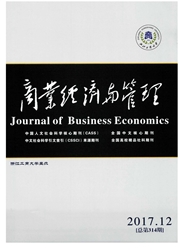

 中文摘要:
中文摘要:
本研究从品牌资产的视角出发,考察品牌信任和品牌情感影响消费者口碑传播行为意向的机制,特别是挖掘了品牌态度和态度不确定性在以上作用机制中扮演的角色。以3C行业为背景通过问卷调查收集数据并对概念模型和假设进行检验,共获得287份有效样本。研究结果显示,消费者的口碑传播意向受品牌信任和品牌情感的共同影响。而且,品牌信任和品牌情感对口碑传播意向的影响分别通过提升品牌态度以及强化态度确定性的路径发挥作用。同时,品牌态度的确定性不仅对口碑传播具有积极的主效应,而且还在品牌态度与口碑传播的关系中起调节作用。
 英文摘要:
英文摘要:
Word-of-mouth is regarded as a more reliable and acceptable information source. In business practice, many companies start to actively initiate word-of-mouth among consumers as a cheap way of building up customer base. Word-of-mouth refers to non-business interpersonal oral communication between the information senders and recipients. This study adopts attitude theory and trust theory from social psychology and examines the mechanism how brand trust and brand affect influence the extent to which consumers tend to conduct word-of-moth communication. A conceptual model linking brand trust and brand affect to word-of-mouth communication intention, with attitude and attitude certainty as mediating factors, is proposed, and then examined in the context of electronic product industry. Results indicate that both brand trust and brand affect have positive effect on brand attitude and attitude certainty. In addition, positive brand at- titude and higher attitude certainty both motivate word-of-mouth communication intention. More importantly, brand attitude certainty play a moderating role in the effect of positive brand attitude on word-of-mouth communication intention. It implies that brand managers should emphasize what affective responses that brands could motivate during consumers' usage, and monitor not only the good or bad of consumers' evaluation but also whether they are confident in their evaluation. In addition, different from purchasing intention, word-of-mouth communication intention may require more positive and certain attitude to support. In conclusion, this study provides managerial implications on how to identify the potential word-of-mouth communicators based on cognitive and affective reactions as well as general attitudinal characteristics.
 同期刊论文项目
同期刊论文项目
 同项目期刊论文
同项目期刊论文
 期刊信息
期刊信息
